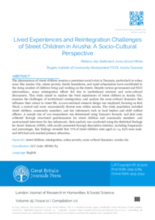The phenomenon of street children remains a persistent social crisis in Tanzania, particularly in urban areas like Arusha City, where poverty, family breakdown, and rapid urbanization have contributed to the rising number of children living and working on the streets. Despite various government and NGO interventions, many reintegration efforts fail due to institutional mistrust and socio-cultural disconnects. This study aimed to explore the lived experiences of street children in Arusha City, examine the challenges of institutional reintegration, and analyze the socio-cultural dynamics that influence their return to street life. A cross-sectional research design was employed, focusing on Kati Ward, a central and socio-economically diverse area within Arusha. The study population included street children, community members, and key informants such as local leaders and child welfare officers. A sample size of 100 respondents was determined using Yamane’s formula and data were collected through structured questionnaires for street children and community members and unstructured interviews for key informants. Data analysis was conducted using the Statistical Package for Social Sciences (SPSS), with results presented through descriptive statistics, including frequencies and percentages. Key findings revealed that 77% of street children were aged 10–14, 82% were male, and 68% had only reached primary education.

